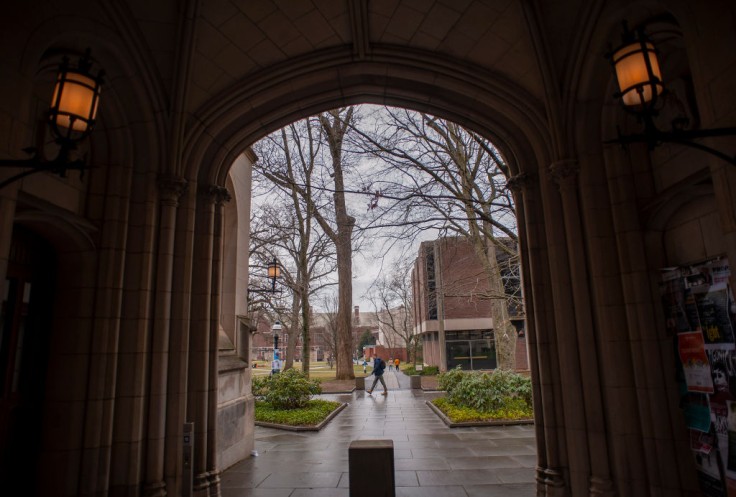Princeton University Investigates After Protesters Disrupt Naftali Bennett Event with Chants and Fire Alarm
By
Princeton University is grappling with the fallout from a tumultuous event on Monday, April 7, 2025, featuring former Israeli Prime Minister Naftali Bennett, which was cut short by protesters chanting accusations of genocide, pulling a fire alarm, and clashing with attendees. The incident, hosted by the Center for Jewish Life (CJL) in McCosh 10, has prompted a university investigation and reignited debates over free speech and campus civility.
According to Princeton Alumni Weekly, The event, co-sponsored by the School of Public and International Affairs, the Program in Judaic Studies, Scharf Family Chabad House, and the Mamdouha S. Bobst Center for Peace and Justice, drew around 200 attendees. Moderated by Rabbi Gil Steinlauf '91, the CJL's executive director, it began at 7:30 p.m. with Bennett's off-the-record remarks. Just 20 minutes in, approximately 20 protesters stood and chanted, "Naftali Bennett, you can't hide, we charge you with genocide," before exiting to join a larger demonstration of about 200 people in McCosh Courtyard.
Escalating Tensions
The disruptions escalated when Sayel Kayed, an unaffiliated individual seated near the front, stood and shouted Gaza civilian death tolls at Bennett, yelling, "15,000 children killed, what do you say to that?" Kayed later boasted about the interruption on Instagram. Bennett fired back, saying, "Instead of whining for the past 80 years and building your own future, you have focused on killing the Jews. It's time the Palestinians stopped whining," according to videos circulating online.
The event reached a breaking point at 8:17 p.m. when a fire alarm—suspected by organizers to have been deliberately triggered—forced an early end. Attendees responded with defiance, singing "Hatikvah," Israel's national anthem, as they dispersed. Outside, verbal confrontations erupted between protesters and event-goers, with reports of antisemitic remarks like "go back to Europe" and "inbred swine," alongside the display of an upside-down triangle, a symbol linked to Hamas targeting.
Disruptors at @Princeton shouted at, pulled a fire alarm on, and walked out of former Israeli Prime Minister Naftali Bennett's speech yesterday. We're starting to sound like a broken record, but event disruptions are not free expression! pic.twitter.com/m7dYg3fvVv
— FIRE (@TheFIREorg) April 8, 2025
University and Community Reactions
Princeton President Christopher Eisgruber '83 condemned the disruptions as "reprehensible and intolerable" in a statement to The Daily Princetonian on April 8, confirming an investigation to identify and discipline those involved, including at least one non-affiliate. "Prime Minister Bennett, like all speakers on our campus, had every right to be heard without disruption and to be treated with dignity," Eisgruber said, adding that he personally apologized to Bennett.
Rabbi Steinlauf praised the resilience of attendees, writing to the CJL community, "Those who tried to silence us could not succeed. Their efforts to disrupt the event instead brought forth something even stronger: a joyful, defiant affirmation of Jewish life and identity." Meanwhile, pro-Israel groups B'Artzeinu Princeton and Tigers for Israel demanded stronger action, citing antisemitic rhetoric and calling for a campus-wide mask ban and the dissolution of Princeton's Students for Justice in Palestine chapter.
A Campus Divided
The incident follows a recent Trump administration decision to suspend $210 million in research grants to Princeton over antisemitism concerns tied to prior protests, adding fuel to an already charged atmosphere. For some, the disruption underscores a failure to protect free expression; for others, it's a justified response to hosting a polarizing figure like Bennett, who has long opposed Palestinian statehood and once remarked in 2013, "I already killed lots of Arabs in my life, and there is absolutely no problem with that," a quote protesters highlighted.
As the investigation unfolds, Princeton faces a reckoning over how to balance open discourse with rising tensions. The outcome could set a precedent for how universities nationwide navigate contentious speakers in an era of heightened activism.
Ripple Effects of Funding Cuts
The Trump administration's decision to cut nearly $4 million from Princeton's climate research, alongside a prior suspension of $210 million in grants over antisemitism probes, is sending shockwaves beyond the university's ivy-covered walls. These financial penalties threaten to disrupt groundbreaking research in fields like climate modeling and seasonal predictability, potentially stalling innovations that benefit national and global communities. Faculty and students fear a chilling effect on academic inquiry, while other institutions watch nervously, anticipating similar reprisals. The cuts, paired with Eisgruber's vow to resist, could escalate tensions between the administration and higher education, risking a broader erosion of federal support for research at a time when universities are already navigating budget constraints and political scrutiny.
© 2025 University Herald, All rights reserved. Do not reproduce without permission.








